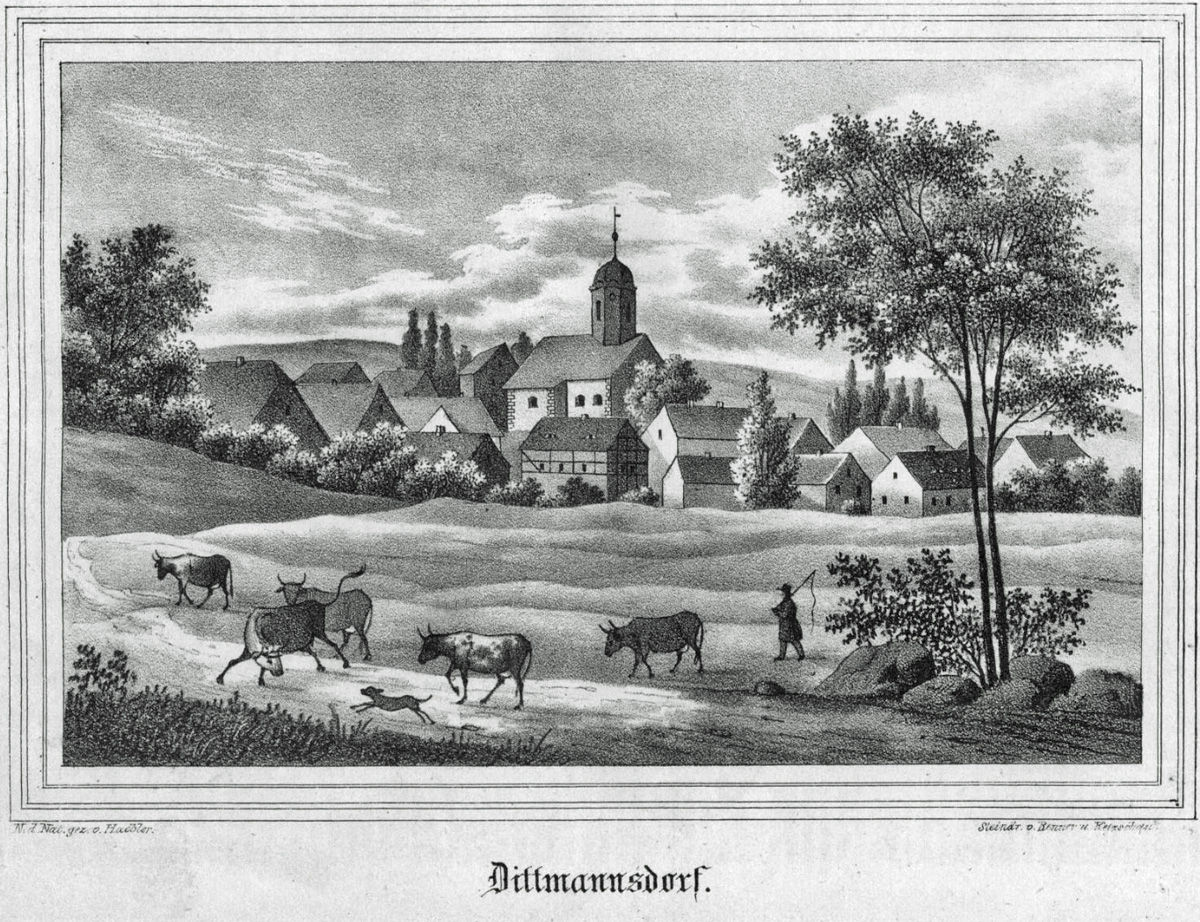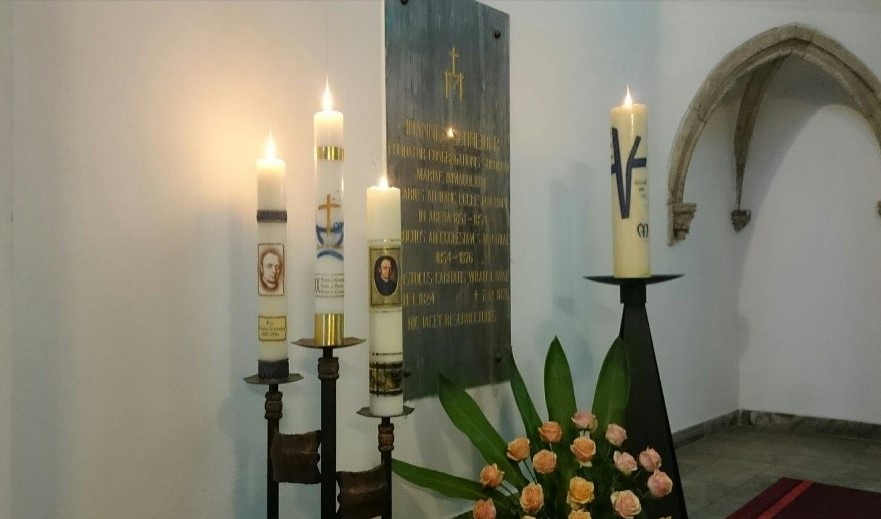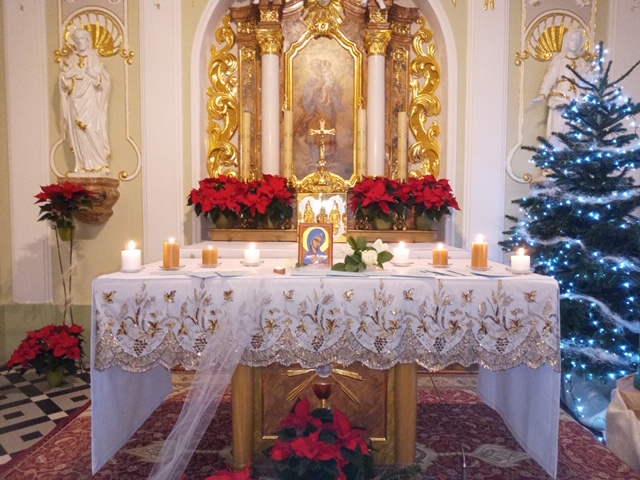
The family home of Fr. John Schneider
The small village of Mieszkowice (Ditmannsdorf), where the Servant of God, Fr. John Schneider’s house house was located in Upper Silesia. In the period of his life, this territory was part of the Kingdom of Prussia. This state, in turn, was part of the German Confederation in the years 1815-1866. From 1871 country of the German Empire.
Already in 1464, the parish church of St. George. After the Reformation, it was assigned to the neighboring, 3 km away. parish church in Rudziczka and from that time until now it has been a subsidiary church.
In 1819, the village of Mieszkowice had only 812 inhabitants. Within 25 years, the town grew in terms of the number of inhabitants – in 1845 there were 218 houses with 1,246 inhabitants in Mieszkowice, including 480 Catholics. Catholics were therefore a minority among the Evangelicals. Rudziczka, where the parish church was located, was inhabited mainly by Catholics. From 1821, the priest of the Roman Catholic parish in Rudziczka was Fr. Antoni Hoffmann, who until his death was a dean and a zealous priest who took care of the spiritual life of parishioners. He also cared for social issues and education in his parish. Undoubtedly, it had an impact on the lives of the parish inhabitants of that time, including the Servant of God, Fr. John Schneider.
The population in the village made a living mainly from agriculture. Most of the land in these areas were concentrated in the hands of large landowners. Usually, a peasant farm of several plots, usually built on barren soil, could not feed a peasant family. The benefits to the nobility, the state and the Church were so great that they drove the peasant into a debt trap. Therefore, first of all, the poorest class of peasants, to which the family of the Servant of God belonged, recruited hired workers or earning extra money in another profession.
Father of the Servant of God, Johannes Georg Schneider, born in 1797 in Mieszkowice. At the age of 24, on September 30, 1821, he married Katharina Krämer, who was four years older, from the village of Łąka, 10 km south of Rudziczka. They received this sacrament in the church in Mieszkowice. The mother of the Servant of God, Katharina Krämer, worked as a servant before her wedding. They both came from poor farmers’ families. At the time of concluding the sacrament of marriage, Johannes’s father and the grandfather of the Servant of God were already dead. The young couple lived in Mieszkowice in an initially rented small house, covered with thatched roofs, standing by the road to Szybowice. They had no land of their own. Thanks to hard work and a frugal lifestyle, the Schneider family managed to buy the house in which they lived. Their first child (Servant of God Fr. John) was born in January 1824, his mother Katharina was then 31 years old. Two more daughters were born in 1827 and 1832. The father of the Servant of God initially worked as a butcher, but his earnings were insufficient to support a family of five. Later he was employed as a laborer on the parish farm in Rudziczka and in winter he went to the spinning farms. Mother was also a model of diligence. Apart from many household and upbringing duties, she worked in various households where possible, supporting a modest home budget. In the discussed period, the earnings of a farm worker were shaped, depending on the season and local conditions, from 4 to 7 silver groszy a day for men and from 2 to 3 for women. Thus, the weekly earnings of a man – a mercenary in the farm were around 1 thaler. The total income of the Schneider’s family should be estimated at 80-120 thalers per year, which is approximately 16-20 thalers per person on average. It was a modest sum, from which it was not easy to meet even the basic needs of the family. The price of rye was 2 thalers for half a bushel (1 bushel is about 54 liters), and for 1 pound of bread (1 pound is about 400 grams) you had to pay 1 thaler or more. If we assume that the daily portion of bread per person was 1 pound, then it was impossible to support a family of five from the income obtained by the hired labor in the farm. Potatoes were a bit cheaper and they were the basis of food for the Schneider family and people with a similar social status in Upper Silesia. To support the family, both parents and children had to apply for various additional jobs. It turned out to be especially difficult for Katharina’s mother. Running a house, raising children and working hard to pay were often beyond her strength.
Servant of God Fr. Johannes Schneider was born on January 11, 1824. He was the first child of Johannes George and Katharina Schneider. Already on January 13, in the octave of the Epiphany feast, the priest from Rudziczka Antoni Hoffmann baptized him in the church in Rudziczka and gave him the names – Johannes George. This double name, Hansjörg, was very common in that area – it was also used by the father and grandfather of the Servant of God. Still, he called himself not just John. The godparents were Johann George Hoheisel (according to a friend of the Father’s Servant of God), and Katharina Nitsche, both from Mieszkowice, and as the third Maria Eichner, from a village called Łąka, two hours back, from which the baptized mother also came .
God’s servant had two younger sisters. In 1827, Anna Rosalia (Rosina) Schneider was born, who was baptized on March 5 of the same year. from the hands of Fr. Antoni Hoffmann. On February 3, 1846, she married Johann George Sauer in her hometown village Mieszkowice and moved from her father’s house. Her son, one of four siblings, became a teacher in Upper Silesia, her granddaughter entered the Congregation of the Sisters of Mary Immaculate in 1934.
The second sister of the Servant of God, Maria Johana Schneider, was born on June 27, 1832, and a day later she was baptized in the parish church in Rudziczka. On February 8, 1847, she married George Graber, a laborer in a large parish farm in Rudziczka, and moved from her family home to her husband. At the time of marriage, Maria Johana was only 15 years old. Such an early marriage was certainly influenced by the premature death of the mother. The widower Johannes Schneider remained with two daughters, ages 17 and 12. He married the older one two years after his wife’s death, and the younger one the following year. The marriage of Maria and George had four sons and one daughter. Out of five siblings, as Fr. Josef Schweter emphasizes, a historian and chronicler dealing with the life and activity of the Servant of God, in 1934, only one son, Augusto Graber, lived in Rudziczka, who was 76 years old at the time.
The Servant of God Johannes Schneider was not closely associated with his siblings. He did not have the opportunity to spend his childhood with his sisters. Both were younger than him by 3 and 8 years, which in the case of the youngest Maria Johana was a big age difference. The relations between them were certainly also determined by the sex of their siblings, and thus the interests and duties that they had to perform as children. Moreover, young Johannes left his family home at the age of 13 to study in Nysa, and with this event the shared childhood of the Schneider siblings ended. The servant of God Johannes, far from being overly attached to his relatives, however, always had a tender heart for them, supporting them when needed.
From an early age, little Janek had the features of a prudent and mature child for his age. He imitated his hard-working parents with great love and respect. Their trustful devotion was imprinted deeply in the child’s disposition. Fulfilling the commandment to honor father and mother in the Schneider’s family was not only the children’s duty, but it flowed from natural relationships based on love and responsibility. Deep respect and gratitude always accompanied Father John for those who surrounded him with care and love in their childhood. Never either was he ever ashamed of their poverty and deprivation. From his family home he brought out a deep religiousness that distinguished him also in his adult life. The Schneider family was regarded as zealous Catholics who were involved in the life of the parish. This is evidenced by, among others good contact between the Father of the Servant of God and the parish priest at the time. The example of authentic faith and prayer at home influenced Father Schneider’s religious attitude from an early age and was certainly a support in his adolescence, when, away from his relatives, he gained knowledge in a gymnasium in Nysa, and then during his studies in Wrocław.
S.M. Sybilla Kołtan
See also:
https://generalato.com/en/duplicated-duchowosc-i-charyzmat-wiernosc/




